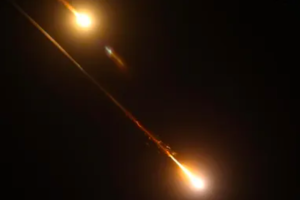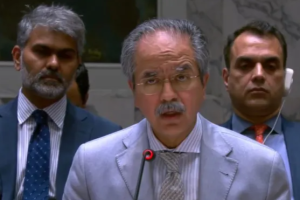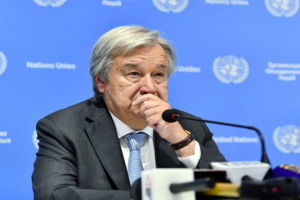TRILOK SINGH: India’s Prime Minister Narendra Modi gestures as he speaks at the Opening Plenary during the World Economic Forum (WEF) annual meeting in Davos, Switzerland, January 23, 2018. PM Modi, who became the first Indian Prime Minister to address the World Economic Forum’s annual summit here in two decades, talked about grave concerns facing the world, including terrorism and climate change.. We may say that, his speech was Very insightful and relevant in every phase of life. Many authors also suggest that his speech was very educative even for a micro level “a family” to macro level “the world”. Specifically, This year the topic here is ‘Creating a shared future in a fractured world’. New powers are changing the balance between Economic & Political strength..
‘The Last time an Indian PM was in Davos, 21 years ago, India’s GDP was around $400bn. And Today, it’s six times’. Now, ‘data is the biggest resource of technology’. So, there is a race to control the mountains of data on the internet. Prime Minister Narendra Modi said at the World Economic Forum’s Annual Meeting on Jan 23, 2018 in Davos, Switzerland.
Significantly, The global flow of data is creating big opportunities and big challenges as well. The Prime Minister of India also believes there are three main challenges that threaten the future humanity, the first being climate change. While Mahatma Gandhi was against greed and exploitation, so how have we moved to greed-based consumption.
Economically, ‘Import and Exports policy becomes so easy in India’, but in an interconnected world, globalization is losing its lustre. Do global organizations created after the Second World War really reflect the aspirations and dreams of mankind. With respect to the developing countries there is a very big gap. Reform, Perform and Transform is our main goals. In India, “democracy, demography and dynamism” are shaping development and growth that is inclusive. We can not exploit any countries Natural resources. While India aims to produce 175 gigawatts of renewable energy by 2022.
Here is my speech at @wef. #IndiaMeansBusiness https://t.co/aNfEUmR5yZ pic.twitter.com/mRzY393fkH
— Narendra Modi (@narendramodi) January 23, 2018
In other words, In the last three years we’ve achieved a third of our goal. “If you want wellness along with wealth, wholeness along with health and peace with prosperity.” through the Respect of democracy and peace we can cycle many issues world wide. Said, The Prime Minister.
In his speech, Modi laid out three big challenges facing the world: climate change, terrorism and growing protectionism:
Climate Change
Climate change, terrorism and the backlash against globalization are the three most significant challenges to civilization as we know it, Indian Prime Minister Narendra Modi said at the World Economic Forum’s Annual Meeting 2018 in Davos, Switzerland. With the same light, “Glaciers are receding, ice caps are melting in the Arctic, many islands are sinking… There can be floods, or there can be drought, we are seeing the impact of extreme weather conditions.
“Everyone talks about reducing carbon emissions but there are very few people or countries who back their words with their resources to help developing countries to adopt appropriate technology. Very few of them come forward to help”. We have moved from a model of frugal consumption, to needs-based consumption, to greed-based consumption, said the Indian Prime Minister.
Terrorism
The Other great challenge is Terrorism. Terrorism is dangerous, but equally dangerous is the artificial distinction between good and bad terrorists. He also hopes that the world can find a solution to the radicalization of young people. So, more and more countries are becoming focused on themselves. This radicalization of young people is of particular concern to the Prime Minister. “The other serious contemporary aspect to which I wish to draw your attention, is that educated, well-to-do youth are being radicalized.. I hope that this forum will discuss solutions to the fault lines created by terrorism and violence.” Said, The Prime Minister.
PM @narendramodi speaks about globalisation at the @wef. #IndiaMeansBusiness pic.twitter.com/45b5tRcbIs
— PMO India (@PMOIndia) January 23, 2018
Globalization
They want to reverse the natural flow of globalization, he adds. Bilateral trade agreements have come to a standstill. Most nations have seen a decrease in cross-border investment. Growth in the global supply chain has been stopped. The answer to this is not isolation, but accepting change. In a fractured world, we need to ensure the major powers co-operate, and that competitiveness among nations does not become a wall between us. The opposite of globalization is happening. Everyone is talking about an interconnected world, but we have to realize that globalization is losing its lustre. The forces of protectionism are raising their heads. “The result of this is that we are seeing new types of tariff and non-tariff-based barriers being imposed. Bilateral and multilateral trade negotiations appear to have come to a halt”. Said, The Prime Minister…
Investing in India, travelling to India and manufacturing in India has become much easier, the Prime Minister said, listing his government’s policies for this, “We have pledged to end license raj, we are removing red tape and laying out the red carpet.” The Prime Minister also quoted poet Rabindranath Tagore, saying he had written of “a heaven of freedom where the world is not divided by narrow domestic walls”, and called for turning that into reality, stating that “India will always be a unifying and harmonising force”.
The PM also said that, “India has always believed in values of integration and unity,” stating that amid fast moving economic and political changes in the world, “peace, stability and security face new and serious challenges”. This raises barriers which are punishing people in developing countries. Trade agreements have come to a standstill, many nations have seen a decrease in cross-border investment, and growth in the global supply chain has been stopped. “The solution to this worrisome situation against globalization is not isolation. The solution is in understanding and accepting change”.. Modi said above three factors was a major threat to the world, yet the world had failed to come together to tackle it. He said everyone wanted carbon emissions to be cut, but the rich world was not ready to help developing economies with new technology…
Jai Hind!
About Author
(AUTHOR/WRITER, TRILOK KUMAR SINGH IS CURRENTLY OWNER OF YOUTH DARPAN COMMUNITY MEDIA PLATFORM, IASmind.com AND MANAGING NUMBER OF NATIONAL LEVEL NGOs, INDIA. MR. SINGH ALSO ACHIEVED PG WITH MA, POLITICAL SCIENCE, KIRORI MAL COLLEGE, UNIVERSITY OF DELHI).
























